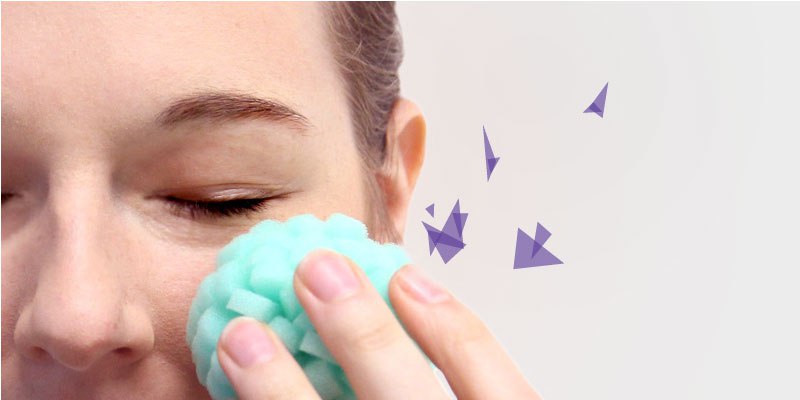To sufferers of eczema, psoriasis, and other dry skin conditions, “exfoliation” brings to mind raw skin, inflammation and a seemingly endless bout with dry skin. However, exfoliating with eczema does not have to be such a difficult endeavor. While eczema sufferers may need to exfoliate less frequently due to their skin sensitivity, they still need to ensure that dried skin cells do not accumulate on the skin and exacerbate the issue. So what is the best way to exfoliate eczema?
Exfoliate once a week and use a gentle exfoliating puff
Exfoliation varies from person to person, and the situation is not different for eczema sufferers. Due to their sensitive and parched skin, most eczema sufferers should exfoliate only once a week at maximum, or even less if their skin becomes irritated after exfoliation (The International Dermal Institute).
The exfoliating tool is often just as important as the method of exfoliation. Avoid more abrasive exfoliators such as pumices or dry brushes, as these can often irritate the skin further. Loofahs are often gentle enough for damaged skin, but they can harbor a great deal of bacteria that can infect already compromised pores (you can our discussion of loofahs and bacterial growth here) (Journal of Clinical Dermatology). We suggest using the ViaBuff Level 2 Exfoliating Puff (you can read more about here), which was designed specifically for those with both normal and eczematous skin. Our Level 2 Exfoliating Puff is strong enough to remove patches of flaky skin while leaving the healthy and vulnerable skin beneath unscathed. Even better, our puffs are made of non-plant materials that inhibit bacterial colonization, so you don’t have to worry about additional bacteria affecting your eczema.
Use gentle exfoliating ingredients
If you suffer from more severe forms of eczema that have many dried plaques or patches of flaky skin, you should avoid any sort of harsh detergents, soaps, abrasives, and fragranced products. Exfoliating serum containing fragments of shells or sharp exfoliating beads may also cause irritation. Instead, you should use the gentle exfoliators, salicylic and lactic acid.
Lactic acid is an alpha hydroxyl acid that does not exfoliate skin so much by removing dead skin cells, but rather by promoting cell turnover. A solution containing 12% lactic acid was able to improve the number of fine lines and wrinkles, improve skin smoothness and improve dermal and epidermal firmness and thickness, ensuring more healthy skin (Journal of the American Academy of Dermatology). Lactic acid also is able to improve skin roughness, hyperpigmentation and sallowness (Archives of Dermatology), which may prove useful when treating sign scarring from eczema lesions and improve the texture of roughened and tough eczematous lesions.
Salicylic acid is also a strong yet gentle exfoliator. One of the most potent keratolytic agents in skin care, salicylic acid exfoliates by weakening the bonds between hardened skin cells, thereby loosening cells to be exfoliated and softening the outer layers of skin (Clinics in Dermatology, SkinMed). For example, one case study found that within one week of regularly applying salicylic acid , a patient suffering from hyperkeratosis (hardening of the skin) in the heels saw a drastic improvement in terms of skin texture (less peeling), hydration, irritation and pain (SkinMed)
Moisturize
Without regular exfoliation and removal of debris, moisturizers will not be able to penetrate and nourish the skin properly. Even worse, dry and damaged skin will continue to flake unless it can absorb more moisture However, any old moisturizer won’t help with your eczema. You should look for ingredients which penetrate deeply into the skin and both replace and maintain skin’s moisture. Ingredients which can soothe inflammation, improve barrier function and eliminate bacteria are even better. Jojoba oil is a great ingredient for dry skin sufferers because it is able to mimic skin’s natural oils, and fool the skin into thinking that it is overproducing oils. This in turn kick starts the skin into producing more healthy amounts of oil, thus hydrating the skin (Dr. Joshua Zeicher for HowStuffWorks.com, Skin and Allergy News). Jojoba oil purportedly has hydrating and healing abilities that may be able to soothe dry skin.
Coconut oil is also renowned for its hydrating abilities, and was found in a study from the journal Dermatitis to greatly improve skin’s moisture and lipid levels in suffers of mild to moderate xerosis (dry skin). A study from the Natural Medicine Journal also noted that coconut oil’s potent anti-microbial and anti-fungal properties made it s a strong candidate for killing gram-positive and gram-negative bacteria and Candida species bacteria. Given its low potential for irritation, the researchers of this study hypothesized that coconut oil may be of immense benefit in treating minor to moderate skin infections, such as wound infections, polymicrobial atopic dermatitis (dry skin), and P acnes.
Calendula officinalis is also renowned for its ability to treat dry skin. For example, it was found in one study to treat the symptoms of exfoliative cheilitis, or excessive drying and flaking of the skin on the lips (Cases Journal). Calendula officinalis has also demonstrated significant anti-microbial and anti-fungal properties against gram positive and negative pathogens, as well as fungi (Complementary Therapies in Clinical Practice). Even better, this plant extract has potent anti-inflammatory and anti-oedematous (anti-swelling) abilities that are likely beneficial in treating severely dried or lesion skin (Tropical Journal of Pharmaceutical Research)
Bottom Line
Treating eczematous skin can be tricky – exfoliate too frequently and you can further irritate already dehydrated and sensitive skin. For the best results, you should exfoliate about once a week using one a ViaBuff Level 2 Exfoliating Puff and a gentle exfoliating cream containing lactic or salicylic acid. You should follow up with a soothing moisturizing that contains anti-inflammatory, anti-bacterial, and hydrating ingredients such as Calendula officinalis and jojoba oil.








Comments 1
Pingback: how to exfoliate eczema skin – Everyday Health Solution